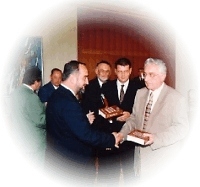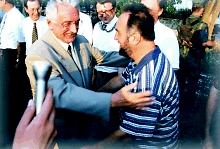

INTRODUCTION
Where do human rights begin ?
How far do they reach ?
When do they have meaning ?
Whom do they inspire ?
What do they accomplish ?
IS THERE ANYTHING WE CAN LEARN FROM WAR ?
Immense humanitarian experience emerged during the wartime conflicts in the territory of the former Yugoslavia. This humanitarian experience has potential to offer significant value towards the advancement of world-wide humanitarian efforts through research, utilization, development, analysis and sharing of this experience.
In this “Information Age” with all of these new modes of communication there is the danger that this information will not be used, that this information will not be shared, that this information will not be utilized. There is danger that this information will be forgotten.

The immense humanitarian experience that emerged during the wartime conflicts in the territory of the former Yugoslavia is a potential of invaluable significance for the advancement of humanitarian work in the entire world. There is nonetheless the danger that it is not used and that it may be forgotten.
In the past ten years I have dedicated my life to humanitarian work, discontinuing my involvement in other activities and going to places undergoing the greatest hardships.
The proposals presented herein were articulated gradually over the course of this period, and they are the result of personal and common experiences and practical activity with thousands of people under the most trying circumstances. It is precisely for this reason that they range from daily practicality to the concept of righteousness. Our fundamental objective is to establish the legitimacy of goodness in practice, regulative social mechanisms and science. We are requesting the right to develop a technology of goodness.
In the beginning I was focused on the struggle against genocide, but gradually I came to realize that the struggle for goodness must be placed in the forefront, because this is a direct route in the struggle aginst genocide.
People subject to suffering and expulsion possess an immense power to do good. Under conditions in which humanity is stifled, unimaginable forms of creativity and mutual human support appear. These can be extensively utilized in spite of limited resources. This power, ability and readiness should be given legitimacy and room to develop.
A basic prerequisite for this is that international humanitarian aid should collect more information on the strength and initiative of goodness under conditions of hardship and suffering.
After the Second World War, thanks to the victorious powers, as well as to the personal contribution of great humanists such as, for example, Eleanor Roosevelt and scientists like Dr. Victor Frankl, the Charter on Human Rights was adopted, and the United Nations (UN); the United Nations International Children’s Emergency Fund (UNICEF), the United Nations High Commission for Refugees (UNHCR), the United Nations Educational, Scientific and Cultural Organization (UNESCO), the World Health Organization (WHO) and other organizations were established.
Even today, after this war, we cannot limit ourselves to record experiences of warring, crimes and human rights violations; we must also record humanitarian, peacemaking and all other experiences of goodness.

Today the humanitarian approach is in crisis, because it has an unsatisfactory reputation among the public and it lacks sufficient political and economic support. Present-day scholarship does not show enough interest in the truth on knowledge of humanitarian needs and possibilities, nor does it place adequate value in the desire for creating goodness.
Humanitarian organizations themselves, particularly the specialized agencies of the United Nations, waste more time justifying their failures rather than ensuring the necessary support for the improvement of their work.
Therefore:
I am aware of the difficulties involved in conveying these experiences, but I consider it my obligation to present them and make them available to the general public.
Please read these proposals, so that during 1998 and the 50th anniversary of the Universal Declaration on Human Rights you may take part in the thoughts of people in our region who strived to do good during this past war, and so that you may become a participant and strengthen international humanitarian work through your contributions.
All of your proposals, comments and
experiences will be consolidated and presented to mark the 50th anniversary of
the Universal Declaration of Human Rights on 10 December 1998.
...